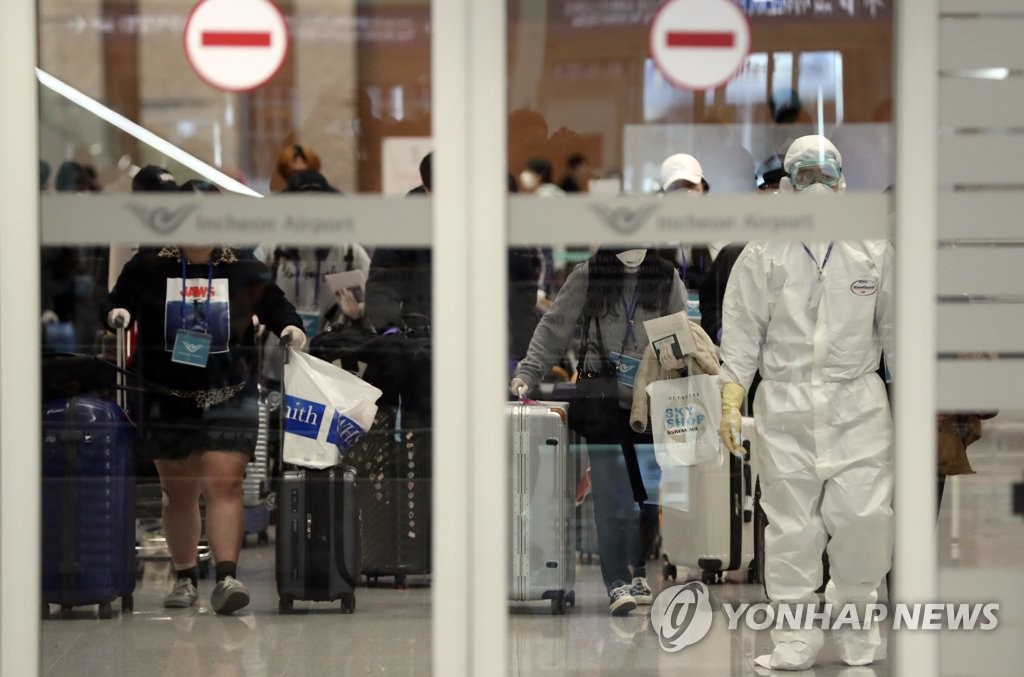- California Assembly OKs highest minimum wage in nation
- S. Korea unveils first graphic cigarette warnings
- US joins with South Korea, Japan in bid to deter North Korea
- LPGA golfer Chun In-gee finally back in action
- S. Korea won’t be top seed in final World Cup qualification round
- US men’s soccer misses 2nd straight Olympics
- US back on track in qualifying with 4-0 win over Guatemala
- High-intensity workout injuries spawn cottage industry
- CDC expands range of Zika mosquitoes into parts of Northeast
- Who knew? ‘The Walking Dead’ is helping families connect
All new arrivals to be placed in mandatory 2-week self-quarantine
South Korea will place all new arrivals in self-quarantine for two weeks as it struggles to stem a rise in new coronavirus cases coming from abroad, the country’s health authorities said Tuesday.
All arrivals will be required to stay at designated facilities, starting at midnight Tuesday, according to the Korea Centers for Disease Control and Prevention (KCDC).
Those that do not have a place of residence here will be charged around 100,000 won (US$82) per day for using public facilities.
In addition, all people in isolation must install a mobile app that allows authorities to monitor them in real time and ensure they are following the rules. They will also be able to report their condition via the app.
The strict quarantine measure comes as 23 percent of the 125 new virus cases reported Monday came from abroad, while local transmissions showed signs of declining. Of all confirmed infections in the country, 518, or 5.3 percent, were infected with COVID-19 overseas.
South Korea has already been enforcing both a two-week quarantine period and virus tests for all long-term arrivals from Europe, regardless of symptoms. Entrants from the United States have also been required to self-isolate at home for two weeks.

Arrivals with fever and other symptoms at Incheon International Airport, west of Seoul, are escorted by a quarantine worker to a screening station to be tested for COVID-19 on March 27, 2020. (Yonhap)
There has been a sharp decrease in the number of people arriving in the country, with the daily tally standing at 6,428 the day before, down from the normal 200,000 before the pandemic paralyzed travel. Of those entering the country, only 20 percent were foreign nationals.
The number of people entering the country is expected to further drop under the new quarantine scheme.
“The government has set aside nine facilities with 1,600 rooms that will be sufficient in handling people coming in from abroad,” Vice Health Minister Kim Ganglip said in a news briefing.
More facilities will be made available if necessary, he said.
Those that have been ordered into quarantine before April 1 will not be subject to the new changes. Those entering the country on official business and humanitarian missions will be exempted as well.
Exemptions will be made for diplomats and foreign government officials, according to the KCDC. Others who want to be excluded from isolation upon arrival are required to receive a waiver from South Korean embassies abroad in advance.
Those excluded from self-quarantine will still be checked for fever and subjected to a virus test. They will be watched carefully and be required to report if they feel ill.
In regard to those who have arrived in the country in the past 14 days, the health authorities will recommend they stay isolated and get tested if they show symptoms like fever, coughing and muscle cramps.
Health authorities stressed that South Korean citizens who fail to follow strict quarantine rules could face jail time of up to one year or a fine of up to 10 million won, with foreigners subject to immediate deportation.
While the government is committed to enforcing quarantine rules, people should be aware that they have been isolated not only for their own benefit but also to protect others, the authorities said.
As of Monday, the country had reported 9,786 cases of COVID-19 after the first case on Jan. 20.











